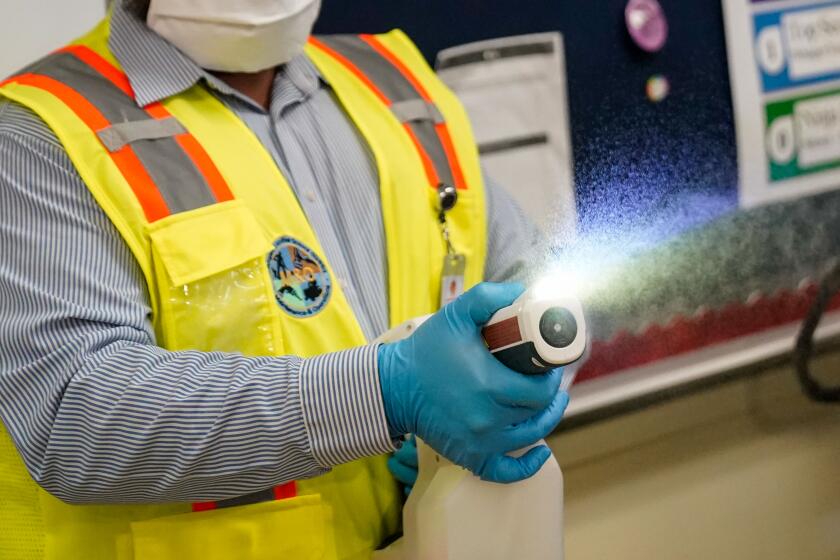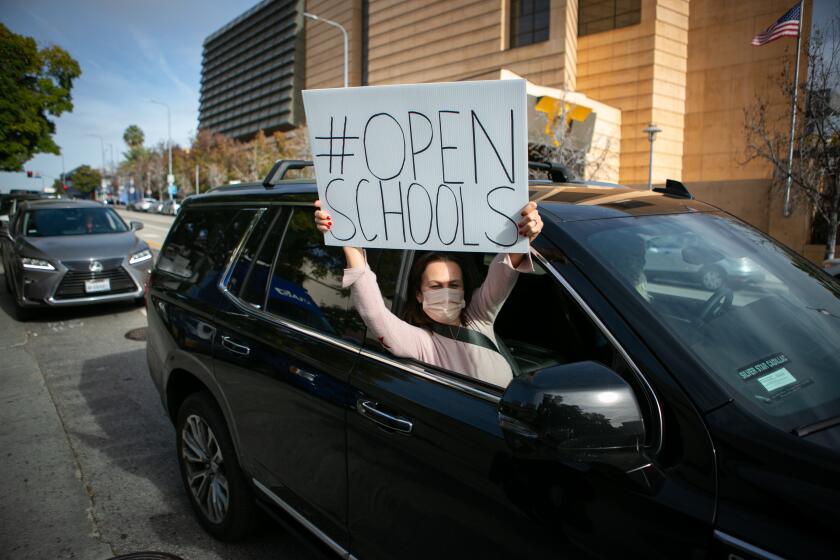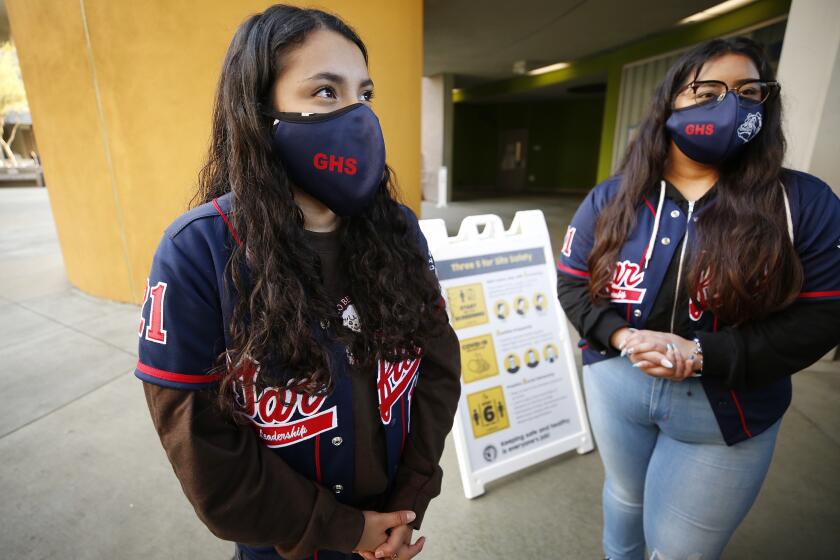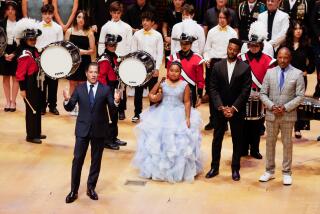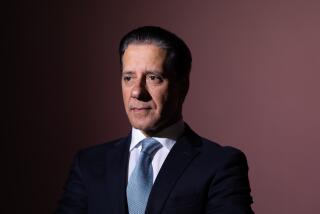In farewell, Beutner calls L.A. schools a ‘model for the nation.’ Others worry about work ahead
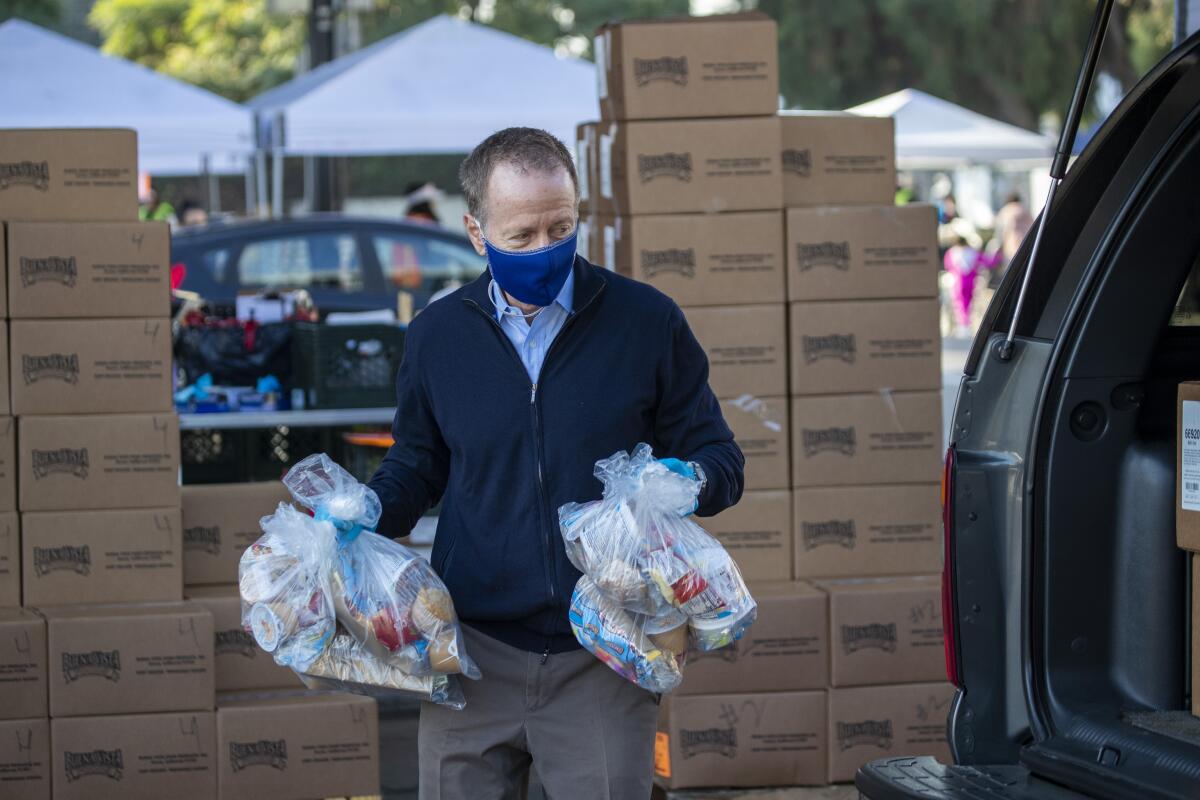
Austin Beutner, the outgoing leader of the Los Angeles Unified School District, took the stage of the Hollywood Bowl on Tuesday to declare that the state of the city’s schools is excellent. But as he focused on accomplishments, others in the audience were pondering the work ahead.
The superintendent of the nation’s second-largest school system read out a lengthy list of achievements, headlined by successful food and economic relief efforts during the COVID-19 pandemic. He also noted encouraging results from a new reading and math program for the early grades, expanded partnerships with the private sector and a decentralization plan that could culminate in the sale of district headquarters.
Beutner stood before school administrators, managers and staff from regional and central offices and made sure to thank them for their hard work, while also trying to define his legacy. He recently announced his decision to step down June 30 after completing his three-year contract.
“If you’ve been paying attention this morning, you’d recognize a pattern which has emerged over these past few years,” Beutner said. “Ideas that are born and bred in our schools — ideas that are born and bred in Los Angeles Unified — are becoming a model for the nation. And I rather like the sound of that. The future of our community, our state and our nation is in our public schools. And I’m pleased to say: The future looks very bright.”
School Board President Kelly Gonez called Beutner’s response to the pandemic “extraordinary,” saying it “set a tone for what a school district can do to support the holistic needs of students, families and communities.”
Campuses shifted to remote instruction on March 16, 2020, and did not offer an on-campus option until April 2021. This fall will present new and formidable challenges as the district resumes a full-time on-campus schedule.
When the nation’s second-largest school district fully reopens in the fall, students and staff will wear masks, regardless of vaccine status, and all will be be tested for the coronavirus at least once every two weeks.
“It’ll be the first time that many of our students are back on our campuses,” Gonez said. “And before that, we have to convince them that it’s safe. There will be a lot of effort this summer to help support students in summer school, but we’ll also need to be doing extensive outreach to make sure that families know what the safety protocols are and what we’re doing to keep their kids safe.
“And then,” she added, “there will be deep work ahead to address the trauma and the academic impacts of the last year and a half.”
Board member Tanya Ortiz Franklin said she was pleased with the district’s enhanced emphasis on students’ social and emotional needs but worries about finding credentialed staff to provide such services. She added that the district needs to focus anew on confronting systemic racial bias and on helping more students become eligible to apply to four-year state colleges.
Maisie Chin, executive director of Community Asset Development Redefining Education, a South L.A. organization that works with parents, said she felt it was appropriate to acknowledge that the school district had “responded to the crisis of the past 15 months with courageous innovation and resilience.”
But, she added, “what’s missing is that L.A. Unified still needs to be pushed to focus and center the most vulnerable, excluded and marginalized families. Many of those families walked away from the district long before the pandemic, and the responsive progress of this past year is only coming after irreparable harm, exclusion and enrollment declines have occurred.”
The “state of the schools” speech typically takes place before the start of a school year and is meant to take stock and set a tone going forward. COVID-19 upended that timing. The turnout on Tuesday — after the end of the school year Friday — was smaller than usual. These speeches are usually held in a large high school auditorium, with the district’s traditional coffee cake served out front. Beutner has preferred higher-profile settings; his previous such address was at Walt Disney Concert Hall.
The district provided bus transportation to the Hollywood Bowl from across the sprawling school system; many buses were nearly empty, but the audience of at least several hundred was in good spirits, applauding frequently — even as temperatures in the sunbaked venue soared during students’ musical performances and Beutner’s talk, which lasted more than 40 minutes.
Although the state is ending most pandemic restrictions, safety issues remain front of mind for many, including Beutner, who said the district worked with experts “to create the nation’s most comprehensive school-based COVID safety program.” The effort included weekly coronavirus testing, enhanced cleaning and ventilation and, ultimately, a vaccination program.
“Working moms must never be the default option for closed schools,” the group’s founding and new executive director said.
A spokeswoman for a coalition that works closely with the teachers union said she appreciated Beutner’s preoccupation with safety.
“We have not always agreed with Supt. Beutner, but he did a very good job of holding the line against pressure to rush to open schools during COVID, when the vast majority of LAUSD families still felt unsafe,” said Ruby Gordillo, a parent leader with Reclaim Our Schools L.A. and Alliance of Californians for Community Empowerment. Gordillo did not attend the event but reviewed text of Beutner’s address.
Another parent, who also reviewed the text, expressed frustration that campuses did not reopen until April and that other districts required more live instruction online during the period when campuses were closed.
“Is Austin Beutner celebrating that LAUSD negotiated the least amount of live online instructional time of any major school district?” asked Christie Pesicka, who has a son at Playa Vista Elementary School and has been involved with a parents group that is critical of the district and the teachers union. “LAUSD definitely did set a ‘new standard,’ but I hope they never become a model for the nation.”
Many who attended the event said they enjoyed reconnecting with colleagues after a year online and look forward to the fall, although Patrick Johnson, a specialist who evaluates services for students with disabilities, admitted to trepidation.
“I was a little nervous, coming out of the house to a big venue for the first time,” said Johnson. He kept his mask on, even though most attendees took theirs off in the heat. The Bowl’s posted policy required masks, making this a rare outbreak of disobedience among a crowd that is typically attentive to rules.
Johnson was encouraged to learn of state and federal aid flooding into L.A. Unified, which Beutner, in his remarks, totaled at $5.5 billion. “From what I understand,” said Johnson, “that means we’re going to get things that we have wanted and needed for a long time, like new counselors, new teachers in some instances, nursing and specialized positions.”
But he worries about the campus dynamic — given that people won’t have to wear masks in public but must continue to wear them at school.
If LAUSD — and all other California districts — do not fully reopen, they would lose state funding under rules already set to take effect.
Jack Foote, a field director who works with school administrators, has concerns about conflicting and evolving safety guidelines: “It’s not predictable. And something we can say today may be deemed not so tomorrow.”
But he added that the district’s newfound ability to deliver services online is something that students can benefit from moving forward.
Several administrators said the work of Beutner, a businessman who had no background in education management, had impressed them.
“Our superintendent has been amazing with ensuring that our students receive resources, such as technology, and also providing them with the vaccinations and regular [coronavirus] testing to ensure that our community has been safe,” said Mistie Barela, principal at Sotomayor Arts and Sciences Magnet High School.
She added that it will be a challenge for the district to determine how much learning loss students have suffered because of extended campus closures, “meeting them where they’re at and taking them where they need to be.”
Times staff writer Paloma Esquivel contributed to this report.
More to Read
Sign up for Essential California
The most important California stories and recommendations in your inbox every morning.
You may occasionally receive promotional content from the Los Angeles Times.
